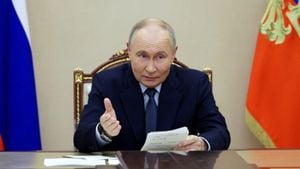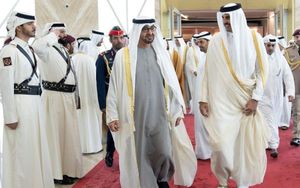The recent Bundestag elections have reshaped the political dynamics in Germany, paving the way for urgent coalition negotiations as the country braces for new leadership. Despite predictions of a strong showing, the CDU, led by Friedrich Merz, emerged as the victor with only 28.5% of the vote. This left the SPD, headed by Olaf Scholz, grappling with its worst electoral performance at just 16.4% since its inception, prompting serious discussions about the path forward for the party.
This election also saw the rise of the far-right AfD, which doubled its voter share to 20.8%, igniting concern among many voters and political analysts about the shifting sentiments within the German electorate. The once-prominent FDP faced disqualification, garnering only 4.3%, leading to the resignation announcement of its leader, Christian Lindner, who stated, "Now I step out of active politics." The overall turnout was notable, with approximately 83% of eligible voters casting their ballots, the highest figure since the reunification of Germany.
Merz’s coalition ambitions are clear. He stated post-election, "The world outside is not waiting for us," signaling the pressing need for swift government formation. He recognized the challenge but exhibited confidence, declaring, “Now we will talk together.” Many believe the most feasible coalition could emerge between the CDU/CSU and the SPD, contingent on their ability to navigate stark ideological divides, particularly on contentious issues like migration and economic policy.
While the SPD has hinted at being open to coalition discussions, internal dissent is brewing. SPD Vice Chair Klara Geywitz expressed skepticism, noting significant differences between the parties, particularly concerning tax policies favoring wealthier citizens. She suggested, “We are at the beginning of a very difficult process, the result of which is still open.” Observers like political scientist Hendrik Träger have raised doubts about the feasibility of achieving consensus before the Easter deadline. He remarked, "I do not believe it is realistic to have a coalition by then," citing the SPD's need for feedback from its base.
Further complicate relationships between the parties is the majority of SPD members’ resistance to joining what some deem another unwelcome grand coalition, following their historical pattern of dissatisfaction from similar arrangements. Anke Rehlinger, the Saarland Minister-President, emphasized on national television, “One must also say, fleeing to the government is surely not without its challenges,” warning against hasty decisions.
Despite these challenges, analysts perceive potential pathways for negotiation. Some suggest the SPD might need to reconsider its reluctance to form alliances, especially with the CDU posing significant risks if forced to rely on extreme elements like the AfD. The prospect of another grand coalition looms large, yet historical tensions remain palpable. These tensions primarily stem from differing policy positions and election dynamics, where the SPD's moderate stance contrasts sharply with the CDU's recent hardline positions, particularly surrounding immigration.
Reflecting on the polarized political climate, former German President Christian Wulff cautioned against the CDU’s campaign strategy, noting, “The polarization, particularly by the CDU/CSU toward the end of the campaign, was blatantly wrong.” He emphasized how such strategies could lead to stronger positions for fringe parties at the expense of traditional political cooperation.
Many expect the direction of coalition negotiations to significantly shape agenda-setting for the new government, especially concerning economic recovery and social policies. CDU Deputy Chair Jens Spahn reiterated the need for urgency, stating, “We must focus on rebuilding trust, which has been lost significantly.” He also stressed the importance of swift action on key issues, including illegal migration—a sentiment echoed across party lines.
With Merz projected to lead Germany’s political future, one major task remains: to unify the party under his leadership and facilitate cooperation across the aisles of the German political spectrum. While the potential for positive outcomes exists, the history of conflict and the declining fortunes of both the SPD and CDU suggest the road to government formation may still be fraught with challenges.
Looking forward, it is clear the stakes are high for all major parties involved as they enter negotiations to explore the viability of new governance structures. Whether this leads to the much-discussed black-red coalition remains to be seen, but the upcoming decisions will undoubtedly lay the groundwork for Germany’s present and future political stability.



